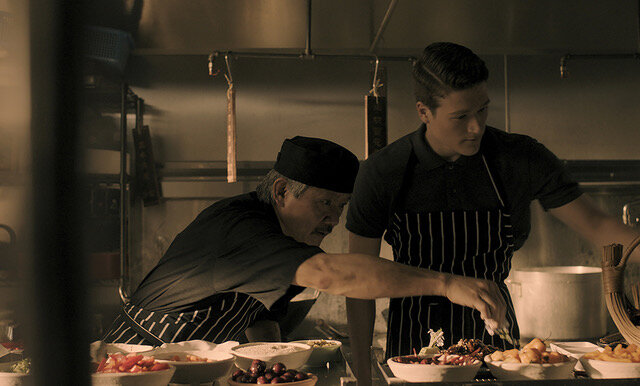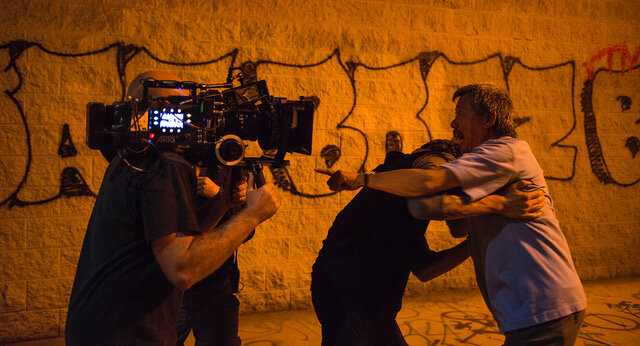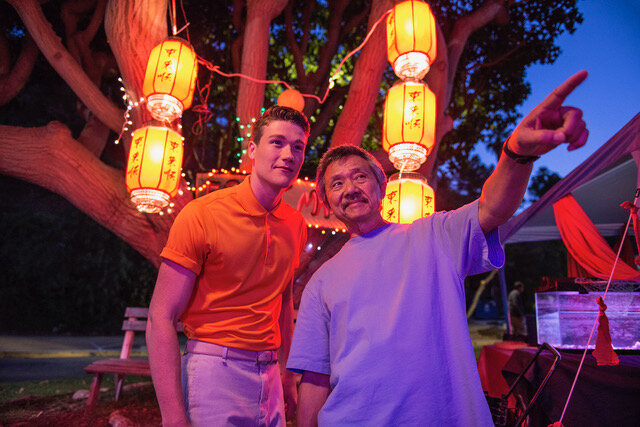Never have so many young minds aspired to a life in filmmaking. Over the last couple of decades the number of film schools has burgeoned, applicants have multiplied, the technology for shooting and cutting a movie has become exponentially more available, and the number of shorts sent on a wing and a prayer to festivals has increased beyond what previously might have been imagined. Suddenly, however, a force arrived out of left field to render filmmaking—a challenge even in the most favorable of circumstances—barely practicable across much of the country. Movies on Zoom or shot strictly within the home flourish maybe—ingenuity tends to find a way—but the complexity of communication on set, its nuances, intimacies, detail, and flow that for practitioners become second nature, or should, are rendered fiendishly challenging even with a Covid-19 compliance officer present. How does the director talk to the actor while socially distanced and wearing a mask? How does the director block a scene, or discuss camera placement and framing with the DP? How, above all else, does everyone stay safe? Covid-19 compliance officers see to that but of course add to costs few can afford. Plus, it has to go wrong just once before the shoot is called off. Under the circumstances, even the weekend iPhone production gets to be tricky, while nothing more than a two minute short becomes a mountain to climb.(Brevity, admittedly, is ever mountainous.)
What then is the aspiring filmmaker to do?
Denied the shoot, maybe this is the time for the budding cineaste to learn? And when learning by doing stops being practical perhaps it's time to commit to learning by learning. After all, it wasn't so long ago that there was no such thing as a smartphone. Before, the world lacked digital cameras, and before that camcorders. Those in the know, might have worked on 8 mm but this was so much more laborious than the ease afforded by contemporary technology. How then did a filmmaker learn? Orson Welles said he worked out how to make movies by watching John Ford’s Stage Coach. Martin Scorsese watched Welles, Fellini, Hitchcock, and the canon of just about any director he could set his eyes on. Isn't it time, now, for those at the start of their careers—and maybe those well into them too—to follow in those footsteps and learn (or relearn) by watching? By “watching” I mean watching not as a consumer, not as a critic, an academic, a sociologist, philosopher or any other category of viewer out there, each adhering to their own particular criteria of assessment, but as a filmmaker, hungry to understand. Observing and listening to both the working minds of those who have come before them, and those currently excelling, the rookie director gains insight into the practice, the challenges those storytellers have encountered and the questions they asked. The student, the filmmaker can figure the means, language, connective tissue by which they made (or make) their movies work, firstly in the world, story, and characters of the narrative, then on the planarity of the screen, and then through the address this makes to the hearts, minds, and guts of their audience—without whom a film can never amount to much more than a forgotten artifact.
These masters would think, ponder, reflect, and closely analyze the elements of dramatic narrative, of visual and auditory language that constitute a movie. In the recent imperative to go out there and make yet another short, in the drive to get up and running on the set or on location, in its excitement and immediacy, that lonely process of the mind can so easily be forgotten. Why bother to learn, why wait, when you can simply go ahead and do?
Even before Covid-19 however, there existed a corresponding factor to dilute the singular journey of the filmmaker—the conflation in all manner of educational programs of disparate topics under the one-size-fits-all banner of “film production”, under which both movie manufacture and creative filmmaking are conceived of as being a single domain. This framing, seen for example in books on so-called film technique and aesthetics, serve only to confuse the student. What if the teachers of creative writing for the novel, for the short story were to give classes on the keyboard, on the computer screen, on the process of book production, the printing, the publication, the distribution? How would that work out for the aspiring author? The category of “film production” is not only misconceived but seduces the student away from the “candy” that is their story and voice, tempting them toward the factory and conveyor belt of its production. The amalgam of the processes of pre-production, physical production, and post production, its skillsets, codes, and subcultures with the creative acts of story-making and storytelling through the language of the moving image can be, and indeed often results in, a debilitating compromise of the emerging—and by its very nature lonely—voice.
Don't get me wrong, those who devote their lives and careers to the manufacture of movies and TV are right be proud of their camaraderie and skills. They should be respected and valued for their dedication to the industry. Without them, no story could be told, no audience sit before that glorious screen, no truth or emotion or mystery conveyed by a movie disseminated. And yet, without the story and the storyteller, there would be no need for the craftspeople. The relationship is a symbiosis, yes, but it consists of two entirely different arenas. When the sovereignty of story and the loneliness of the storyteller are pushed to one side, overshadowed not only by the structures and practice of production but by the worlds of business, marketing, and distribution, the student of filmmaking—as this relates to story, character, and visual language—is subsumed into the universe that serves it.
Fortifying the path through this misconception both at film schools and among a thriving no-film school community, there follows the invitation the fledgling filmmaker yearns for—the beckoning from the club of “working professionals”, the ones who, claiming the knowledge that needs to be known, are seen to have put education behind them and “made it” into a select echelon graced by common assumptions, by awards, by celebrity. “Be one of us!” the industry educator cries. “Come join our coterie!” “Embrace the certainty of professional status!” And so the lonely odyssey of filmmaker as outlier, as dissident, as misfit becomes hamstrung even before it has begun. Herd mentality wins out, group think prevails, the precious resources afforded by the loneliness of individual progress lost to the winds of the craving for belonging. The only interesting ideas are heresies, Susan Sontag said. Well, heresies don’t get you into the coterie—that ticket demands commonplaces.
I worked as a 1st AD, a location scout, and production manager in BBC Drama and Films in the UK for over a decade. I could suss out and nail down a great location, I could schedule a movie, I could run a set, anticipating problems and solving them before they arose, solving them when they arose, I could anticipate the coverage of a scene, know how it might be “hosed down” (in journeyman terminology), I could direct the background action, and I could judge the framing of an image on the basis of the chosen lens without looking through the camera, but I learned very little about story and storytelling, about the rich language of the moving image, its flow of energy, its power as a source of emotion, cognition, visceral sensation, I didn't understand how a key image could encapsulate theme, I didn't understand narrative point of view and how the director and the editor might articulate and shift this, connecting the audience to one particular character or another in particular scenes or at crucial moments or—should this be the desired approach—throughout a movie. I didn't understand the challenges of tone and its modulation, I didn't understand how genre could have so fundamental an impact on how an event might be the depicted, even—in the context of a particular dramatic narrative—on the validity of that event to begin with. In short, I understood what surrounded the creative process while having failed to explore that central endeavor itself. I thought of myself as part of a club, together with the rest of the crew, in a hallowed community of professionals and yet… and yet, although I would try to deny it to myself, I always ended up feeling lonely. I had interacted with others but said nothing. Then, when I began to direct, I wanted even more desperately to belong, now to the community of directors, to be a member of that esteemed group, safe and sound in that home, that noble family.
It wasn't until I found myself teaching—and when I realized my daunting responsibility toward the development of the young directors under my tutelage—that I came to see what constitutes the progress of the filmmaker through an entirely different (metaphorical) lens. Many of the teachers who were my peers, excellent as they were, would be eager to shepherd their students into the club while I found myself in thrall to an altogether more exciting task: the facilitating of diverse, distinctive sensibilities and voices through the exploration of story and craft. This was not only an act of kindness—nothing wrong in that, whatever the current zeitgeist—but a collaboration to lead the student toward notable, compelling, and above all distinctive filmmaking. When the emotion of a story and the emotion rooted in the one telling it finds agency up on the screen, personal vision speaks. Second-guess perspectives, afforded by those content to conform, to play by teacher’s rules, to be members of the club by contrast resonate less. Films of such complexion offer at best immediate gratification but along with the empty cartons and cans of concessions left strewn across a movie theater’s auditorium, are quickly forgotten and having fallen short in conveying the questions of life common to us all leave us with a sense of emptiness. We have seen it all before and now we've seen it again. Paradoxically, it is the singular vision that is recognized by, and resonates with us. The personal becomes universal and stays with us after the movie has come to its end. It is the individual creative soul that speaks to our common humanity, its loneliness which speaks to our togetherness, not as members of any club, or clique or self congratulatory subculture, but as people of all backgrounds and kinds going about our lives day by day.
We are living through tough circumstances certainly, and for some their predicaments are formidably severe, yet for filmmakers, the opportunity not to be distracted by the imperatives of manufacture and membership but to focus on the heart of story and emotion, is there. Together with their peers, the new cineaste can be lonely, and lonely be together, so that when moviemaking becomes a touch more doable—and this can’t come too soon—the films they make connect at an enduring level to the audiences they draw.
The purpose of art is to lay bare the questions that have been hidden by the answers, James Baldwin wrote. You learn the answers in order to gain admittance to the club. Outside, you search for the questions to connect you with the biggest club all—humanity.
Peter Markham October 2020
Author: What’s the Story? The Director Meets Their Screenplay. (Focal Press/Routledge)
https://linktr.ee/filmdirectingclass









